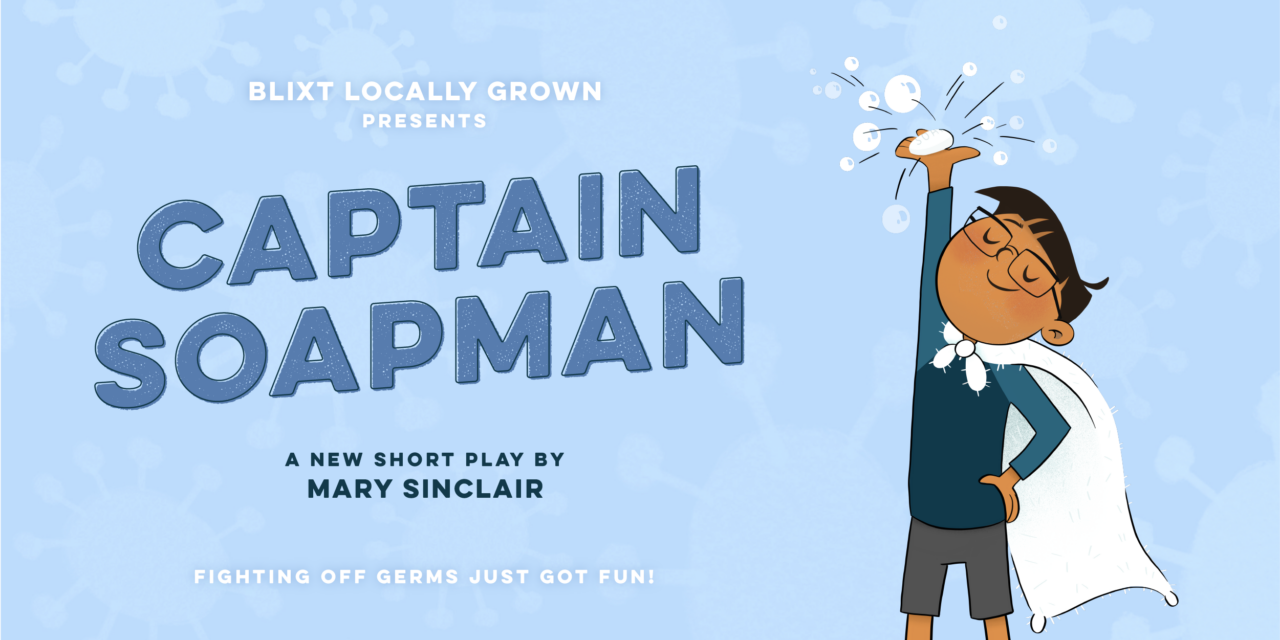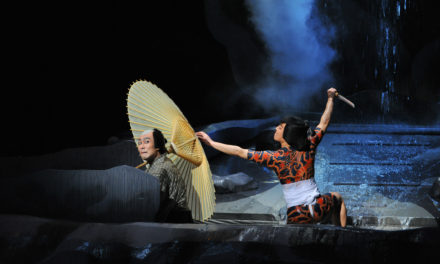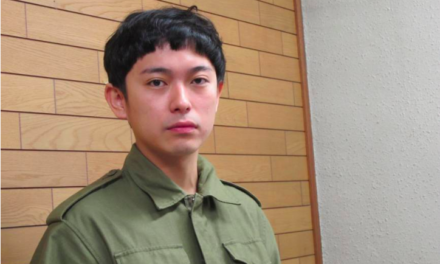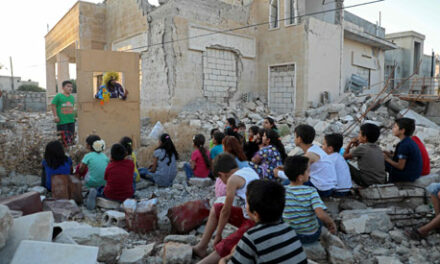BLIXT Locally Grown was born on “a car ride between Scottsbluff and Lincoln,” Becky Boesen recalls, “after teaching a workshop, with big open skies above us.” BLIXT’s co-founder, Petra Wahlqvist, remembers that time just as vividly: after a year of working in tandem with Lincoln, Nebraska’s Lied Center for Performing Arts, they “both left our full-time employment…we did not have any safety nets; we didn’t even have contracts lined up.” Nevertheless, they “had trust we could make it happen.” That was in 2015, and they’ve been making it happen ever since. I sat down on Zoom with both Boesen and Wahlqvist to have a chat with them about their community engagement-driven company, how they’ve been adapting to COVID-19, and their new virtual theatre project, Captain Soapman, which helps children navigate this new COVID-19 world.
Rhiannon Ling: How did the two of you come to decide what BLIXT’s focus would be? Was that something you decided along the way, or something you felt passionate about beforehand?
Petra Wahlqvist: I’d say that we’ve always had a core of what we’ve done. We’ve always been passionate about community building and we’re champions of original works. Our model has been that we have an original artistic work that addresses a social issue that’s important. We feel like if we have a shared experience around an artwork, then we can talk about it in a different way than if we just say, for instance, “Hey, let’s talk about grief!” And a lot of our work is education-based, so we do a lot of workshops for all ages. I think that has been consistent from the start, but we continue to learn as we go. We’re still crystallizing our business, but we’ve always had a very consistent throughline of what we do.
Becky Boesen: Part of the attributes that artists have as entrepreneurs is we’re willing to take risks and trust what we can’t see. We make windows open for that in our work. There are some things we set in stone, but we know that if we leave a little bit of unknown, what happens in the spaces in between is actually going to teach us about what our business is.
Wahlqvist: Our partners are a big part of what we do. We don’t create in isolation; we are always connected to other community partners. We always want to maximize what we do, and we always want to have it as available and accessible as possible to communities, and we find that when we partner with others, we learn from them and can go even bigger.
Ling: How have you been adapting to the new coronavirus restrictions, especially with being a company that is so focused on community engagement?
Boesen: One of the first conversations we had when everything started to fall down was a serious conversation about what does this look like for us. We decided, not only are we going to try to adapt a virtual piece, we’re going to make it cool and engaging. We decided to take every part of what we do and use technology as an attribute instead of as a deficit. We enlisted Captain Soapman, and then we thought about, how do we produce this using Zoom as a tool? We’ve just been going for it.
Wahlqvist: We take very seriously what we do, what the arts, in particular theatre, uniquely can do in our society. We have work for all ages, but we have quite a bit of work for younger audiences, and the times are so crazy. We wanted to bring something good, and we thought we could address these issues through theatre, and have it available for our young audiences. And in the process, we have learned so much! It’s been fascinating doing a virtual theatre project, because, even though the final outcome will be a little bit like a film, it’s very much a theatrical process. We’ve just never thought, oh, we can’t do this; we’ve more been like, I’ve never thought about it that way!
Ling: Let’s talk about Captain Soapman for a minute. It started as a contest for your playwriting students, right, Becky?
Boesen: Yes. The first thing I wanted to do was make sure my students were okay, and then help them stabilize their grades. But some of the kids were worried that all of these transitions were going to remove the opportunity for learning that they were paying for. So, hearing this not only from some of my students but from others on social media, I thought it’d be great to put something in place that gives my students a little bit of professional experience. Petra and I created a contest. They were tasked with writing an original, 10-minute-or-less play for young audiences, relevant to themes of COVID-19. We gave them 48 hours, and, a few days later, we selected one play. Originally, we were just going to host a Zoom readthrough. But once we selected this play, and we’re thinking about ways we could engage other artists and make something cool right now, we decided to take it bigger! The project was something that represented goodness, and we wanted to invest in that goodness. So we got all of our best people together; we love this piece that advocates for families taking care of each other during COVID-19, but also, I love the opportunity to share something that we think is special. And of course, because so much of what Petra and I do is based in education, we’ve created a wholly free, interactive curriculum that goes with Captain Soapman. It’s been very fulfilling.
Wahlqvist: It’s been great. As Becky said, so many parts of the project—championing a new work by an emerging playwright and that process—have been very fulfilling. We keep thinking of ways that we can make it more accessible. We have a sign language interpreter who’s signing it for us. It’s also been a contained enough project that it’s been very much in our control, when things are not necessarily in anyone’s control right now. Especially with a truncated timeline: we knew when this was going to come out, and we’ve had about six weeks in total from the start of the competition to actually releasing the video. It’s been a very focused project in that way, which has been nice in this time.
Ling: In that process, have you two discovered that anything lends itself well or better to Zoom, or has it all been very odd?
Boesen: I think it goes back to the content dictates form. I view producing via Zoom like walking into a non-conventional space and making it work. I think if you gave it time, I can only imagine the sort of attributes and facets that would be added on to Zoom technology to make it an artist’s tool. We have learned a lot from this.
Wahlqvist: We have, and we never intended to pretend we’re not doing it virtually. We always said we would just embrace where we are and what we have. We’re not trying to hide it or fight it; we’re just like, yep, let’s take it by the horns and go with it.
Ling: You mentioned you had designed a curriculum for this project. What are your plans with that?
Wahlqvist: We’ve purposely put it on our website rather than format it in an online course tool; we didn’t want it to feel like school. So, it’s designed in a very visually attractive, fun, kind of irreverent, and personal way. That was very much by design, where there’s no login, there’s no registering, nothing like that. It’s very interactive. If you’re a kid on your own, you can just go through it on your own. There’s activities where you would talk to your toy, if there’s no one else around that you can confide in. It’s also an excellent tool if people want to go through it as a family. It would lead to some really in-depth conversations about COVID-19 that maybe are hard to have. We are also working with other organizations, like community learning centers. We are creating it with the purpose of sharing it.
Ling: Have you found that most people have been receptive to this change to virtual theatre?
Boesen: I think, overall, the reaction has been really good. I’m hoping—and what I think I’m hearing—is that something like this is a breath of fresh air right now. A lot of good things come out of this small project. Overall, people seem to be very supportive.
Wahlqvist: I just want to add to that: we didn’t just do this play, Becky was like, hey, why don’t we add a song! So, we have an original song that Becky and David von Kampen had written for another project that we hadn’t utilized. Then, Becky said we should ask some community leaders to sing on it! And that has been a very supportive part of our project.
Boesen: And humbling, how good the response has been.
Wahlqvist: We sent our emails out, and within five minutes, we had a response from the Chancellor. That shows a lot of trust, because we couldn’t show them the project. That is awesome community support for us, but when we put the video out, families will be able to see that leaders from all parts of their life are supporting this.
Ling: Where do you two, as theatre-makers and creatives yourselves, foresee the future?
Boesen: I will just bring up something that I see as an opportunity and possibility: everything that makes the arts what they are are going to be at such a high rate of demand as America moves forward. I don’t just mean entertainment in the theatre. I mean learning how to connect again, learning how to be in the same room again, being flexible about what comes next. All of those things that we learn in the arts are going to be valuable tools going forward. I think artists are so often overlooked as incredible leaders, and this will be a time for artists to step into that role.
Wahlqvist: I agree. There will be a lot to process for us as a nation and as a world, and arts are entirely process-based. So, we have really important skills to share with the world at this time.
To watch Captain Soapman, and to learn more about BLIXT and their community partners, visit their website at blixt.space.
This post was written by the author in their personal capacity.The opinions expressed in this article are the author’s own and do not reflect the view of The Theatre Times, their staff or collaborators.
This post was written by Rhiannon Ling.
The views expressed here belong to the author and do not necessarily reflect our views and opinions.


















